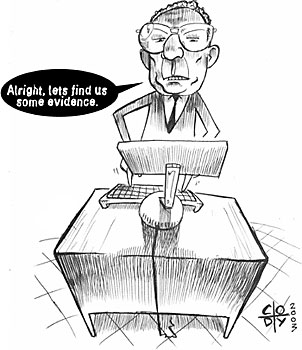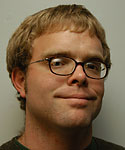
Illustration by Cody Angell
|
By Phil Leckman
Arizona Daily Wildcat
Monday February 17, 2003
Most of the time, academics like attention. Putting together a long-term research project is often a thankless process, and a little publicity can feel like a godsend for the hardworking graduate student or professor who's spent months laboring in obscurity. But the cutthroat world of modern academia is a competitive place. Plagiarism and intellectual theft are all too common. Getting research into print can be gratifying, sure, but only if the name of the original author is still attached to his or her findings.
It's not difficult, then, to imagine the complex mix of emotions that greeted Dr. Ibrahim al-Marashi, a research associate at the Center for Nonproliferation Studies in Monterey, California, earlier this month when he discovered sizeable chunks from one of his recent articles repackaged as part of someone else's work. The new article lifted whole paragraphs verbatim ÷ as many as six at once ÷ from Dr. Marashi's work, even duplicating misplaced commas and other grammatical mistakes in the original. What's worse, Dr. Marashi's name was completely absent from the new piece. He'd never been consulted or even approached by its authors.
Up to this point, Dr. Marashi's dilemma sounds like a cut-and-dried case of academic fraud ÷ the kind of unscrupulous laziness that UA professors and TAs contend with every time they assign a five-page research paper to a freshman INDV class. Based on the grammatical mistakes carried over from Dr. Marashi's originals, it even looks like the plagiarists made their theft from an online version of the paper ÷ as if they found it on Google late one night and hurriedly cut and pasted the relevant chunks.
 |
|
|
But one major piece to the puzzle was the title of this work of academic thievery was "Iraq ÷ Its Infrastructure of Concealment, Deception and Intimidation." And it wasn't published in some academic journal, or submitted as a last-minute term paper by a harried undergrad. No, this was an official report by the British Government, endorsed by Colin Powell and ostensibly offering new, damning evidence of Saddam Hussein's deception derived from the latest, most accurate findings of Britain's intelligence service.
As it turns out, Dr. Marashi's article, which first appeared in press in September 2002, wasn't the only one the report blatantly plagiarized: additional material was apparently pulled from two additional articles, including one published way back in 1997. Neither source was acknowledged.
Behind the obvious entertainment value, was the intelligence agency that inspired James Bond reduced to surfing the ĪNet for material? Was Austin Powers away getting his teeth cleaned that weekend? This story has a deadly serious message: if the latest "evidence" for war amounts to a messy hack job cribbed from dated academic reports, how much faith can we possibly have in the other evidence used to justify this conflict?
As America's war planners and their British lap dogs prepare to put hundreds of thousands of lives and the stability of an entire region on the line, what are the odds that all of us are being lied to?
The British blunder is hardly the only piece of dodgy evidence. Take last week's tape-recorded message from Osama bin Laden exhorting the Muslims of Iraq to rise up and resist America's crusader armies. By and large, this latest rant was pretty typical Osama: denounce the West, denounce the secular non-Islamic governments of the Middle East, then offer inspiration for whichever group or nation happens to be opposing the United States at that instant.
It's the kind of omnibus Islamist cheerleading we've come to expect from the world's most wanted man. What's different, though, is the U.S.'s reaction: in the past, we've questioned the authenticity of Osama's addresses and done everything possible to cast doubt on them. Now, suddenly, we're not just accepting bin Laden's words, we're offering them as "evidence" of ties between Iraq and al-Qaeda. We're even doing advance promotional work for bin Laden ÷ Colin Powell was talking up the latest tape recording in Congress before the al-Jazeera network had even announced they had it.
By no means am I suggesting that the United States is somehow in league with bin Laden. But why the flip-flop? Why are our leaders suddenly accepting at face value what they've heaped scrutiny upon time and time again in the past? Bush and Blair continually make the moral case for this war ÷ we must attack Iraq because it's "right."
How can we possibly accept this argument when the "evidence" our leaders put forward is so blatantly dishonest and full of holes?

